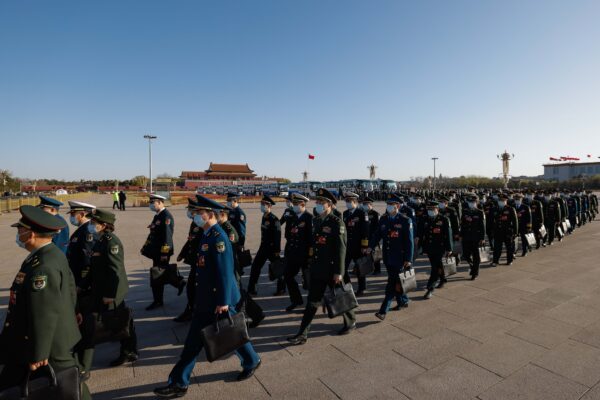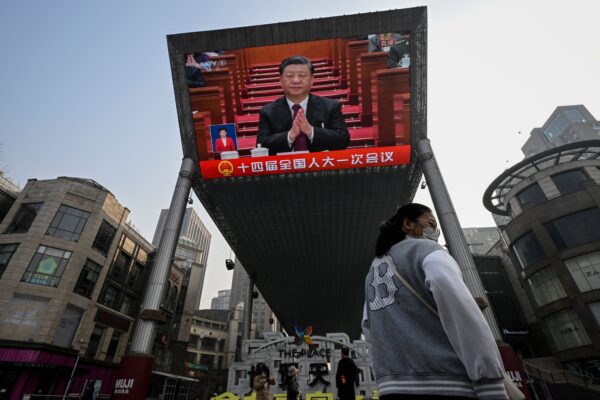China appointed Li Shangfu as its new defense minister, making the general targeted by U.S. sanctions the face of the communist regime’s growing military.
China’s rubber-stamp legislature, the National People’s Congress (NPC), formally confirmed Li’s appointment as the Minister of National Defense and a state councilor on Sunday.
The 65-year-old aerospace engineer succeeds Wei Fenghe, who stepped down from the Central Military Commission, the highest decision-making body overseeing the People’s Liberation Army (PLA), at the Party congress last October after reaching the customary retirement age of 68.
While Li’s new post was viewed as largely diplomatic and ceremonial within China’s ruling system, his promotion has been closely watched by outside analysts given his background.
The Trump administration imposed sanctions on Li for allegedly purchasing fighter jets and equipment from Russia’s main arms exporter Rosoboronexport, in violation of a 2017 sanction law that aimed at punishing Russia for interfering in U.S. elections, aggression in eastern Ukraine, and other activities.
The sanction, announced in 2018, barred Li from entering the United States and accessing any properties and assets in America.
At that time, Li was the director of the Equipment Development Department, a branch under the Central Military Commission responsible for weapons procurement.
(L) The Chinese balloon drifts to the ocean after being shot down off the coast in Surfside Beach, S.C., on Feb. 4, 2023. (R The aircraft carrier USS Carl Vinson participates in a group sail during the Rim of the Pacific exercise off the coast of Hawaii, on July 26, 2018. (Randall Hill/Reuters; Petty Officer 1st Class Arthurgwain L. Marquez/U.S. Navy via AP)
Li’s new tenure comes as the Sino-U.S. relationship is strained over a range of issues, from the communist regime’s economic espionage to assertive military actions against Taiwan. The latest spat was sparked last month by a spy balloon that traversed over the United States for several days before being shot down. On Feb. 7, Pentagon officials said they requested a phone call between Wei and U.S. defense secretary Lloyd Austin but Beijing denied it.
Some analysts said the promotion of Li suggested the communist regime has little interest in easing the tensions with Washington.
When asked last week about Li’s impending rise, Pentagon spokesperson Lieutenant Colonel Marty Meiners said that the U.S. military could not comment on media reports about China’s leadership changes, but that they had been clear in wanting to maintain communications with the PLA.
“Open lines of communication can help us manage risk, avoid miscalculation, and responsibly manage competition,” Meiners said.
An outdoor screen shows a live news coverage of Chinese leader Xi Jinping during the opening session of the National People’s Congress, along a street in Beijing on March 5, 2023. (Jade Gao/AFP via Getty Images)
Li’s elevation was among a series of personnel moves announced during the annual NPC meeting, which closes on Monday.
In the once-in-five-years reshuffle, Xi secured his third term as the head of the state, putting himself on the track to become one of the longest-serving Chinese leaders since Mao Zedong, who ruled the country for 27 years until his death in 1976.
Many of Xi’s loyalists were promoted to the country’s leadership. For example, former Shanghai party chief Li Qiang was named as the Chinese premier, the country’s second-highest post, on Saturday.
Some scholars believe Li has close ties to Zhang Youxia, a close military ally of Xi. The 73-year-old Zhang was elevated to first vice-chairman of the Central Military Commission last October, with Li following him onto the commission’s governing seven-person group.
 Delegates from China’s Armed Forces arrive at the fifth plenary session of the NPC in Beijing on March 12, 2023. (Lintao Zhang/Getty Images)
Delegates from China’s Armed Forces arrive at the fifth plenary session of the NPC in Beijing on March 12, 2023. (Lintao Zhang/Getty Images)
Li spent most of his career in China’s satellite programs, working at the Xichang Satellite Launch Center in Sichuan Province for more than 30 years. In 2007, when Li served as the director of the center, China successfully carried out its first test of anti-satellite weapons.
In 2016, Li was appointed as a deputy commander of the PLA’s then-new Strategic Support Force, an elite body tasked with accelerating the development of the PLA’s space and cyber warfare capabilities.

 An outdoor screen shows a live news coverage of Chinese leader Xi Jinping during the opening session of the National People’s Congress, along a street in Beijing on March 5, 2023. (Jade Gao/AFP via Getty Images)
An outdoor screen shows a live news coverage of Chinese leader Xi Jinping during the opening session of the National People’s Congress, along a street in Beijing on March 5, 2023. (Jade Gao/AFP via Getty Images)